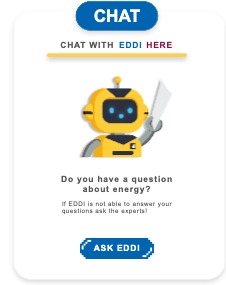

CLICK ON A QUESTION BELOW TO SEE THE ANSWER
Answer: Shoes hanging on a power line don’t get burned for the same reason that birds standing on a power line don’t get shocked: they don’t give electricity a path to the ground, so electricity stays in the line and does not go through them. But if the shoes were to touch a power line and a power pole at the same time, they would provide a path to the ground and would get blasted with electric current. It wouldn’t be pretty!
By the way, if you ever see someone throwing shoes up onto a line, tell them to stop! The shoes can damage the power line, or someone trying to get the shoes down could be seriously shocked or even killed.
Answer: Yes! Manure can be made into a gas containing methane. (Methane is the same energy-rich gas found in natural gas.) Certain types of bacteria emit this gas as they consume manure collected in special air-free tanks. The mixture of gases produced in this way, called biogas, can then be used in some modified car engines instead of gasoline, or burned in a boiler to generate heat or electricity.
Answer: Organic waste emits methane as it decomposes—or rots—in the landfill. Landfills can collect and treat the methane and then sell it as a commercial fuel, or they can burn it to generate steam and electricity. Today, there are almost 915 gas energy landfill projects operating in the United States.
Answer: One lightning strike can carry between 100 million and 1 billion volts—as much electricity as 2.5 million car batteries.
Answer: Replacing your five most frequently used light fixtures or the bulbs in them with ENERGY STAR certified lights can save $70 a year in energy costs.
(Source: Energy Star)
Answer: Ben Franklin probably did not do his famous kite experiment the way it is usually portrayed. (Franklin never wrote about it himself, and the only description we have of it was written by another scholar, Joseph Priestley, 15 years later.) Franklin believed lightning was a flow of electricity taking place in nature. He knew of electricity’s dangers, and would probably not have risked being struck by lightning by flying his kite during a storm. It is more likely that Franklin flew his kite before the storm occurred, and that his famous key gave off an electric spark by drawing small electrical charges from the air.
Answer: Neither! In the wires of an electrical circuit, the electrons are always jiggling around. When a circuit is closed to run an appliance or a light bulb, the electrons jiggle a lot and travel through the wire. When the circuit is open, all the electrons just jiggle where they are—kind of like running in place.
Answer: Yes! An electric eel uses chemicals in its body to manufacture electricity. A large electric eel can produce a charge of up to 650 volts, which is more than five times the shocking power of a household outlet.



DOWNLOAD
Download your home safety inspection checklist
When it comes to electricity, how safe is your home? Do this inspection and find out!
























